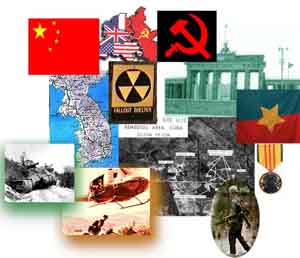Cold War
Essential Purpose
Peace did not arrive when World War II finally came to an end. Instead, the Cold War began. This is an important topic for students to understand, because the Cold War dominated U.S. and world history for almost the entire second half of the 20th century, and its effects are felt today in many ways. This module will engage students in the study of the Cold War: how it began, how it affected people’s lives, how it ended, and how it left a legacy for us today.

National History Standards
- Standard 3A. The student understands major global trends since World War II.
- Analyze Multiple Causation
- Explain why the Cold War took place and ended and assess its significance as a 20th-century event.
- Analyze Multiple Causation
State/Local Standards
States should align these modules to their own state/local standards as appropriate.
Essential Questions
- Why do competing world powers come into conflict?
- How do clashes of ideology impact governments and how people live?
- What problems result from the tension between world powers and how do they attempt to resolve these problems?
Essential Content
Reasons why the Cold War began after World War II:
- Cooperation between the West and Russia during World War II turned to distrust
- U.S. and Russia became dominant powers after WWII and distrusted each other
- U.S. took measures to stop the spread of communism
- The Soviet Union blockaded Berlin and allies responded with airlift
- Soviet Union tested its first A bomb
- China became Communist
Cold War impacted governments and people’s lives
- In other countries
- In the U.S.
- In consequences for international relations
- By contrasting the political, social, and economic systems of the U.S. and Soviet Union
- By setting the framework for international politics from 1945 – 1989
Evolution and ending of the Cold War
- Cold War became less hostile during détente
- Competition was diminished by other concerns
- Mikhail Gorbachev led Soviet Union away from communism
- China moved toward closer ties to the west
- Cold War ended in early 1990s but legacy lives on
Essential Skills
Standards in Historical Thinking
Standard 3 Historical Analysis and Interpretation
- Compare competing historical narratives
- Hypothesize the influence of the past
- Consider multiple perspectives
Standard 4: Historical Analysis and Interpretation
- Formulate historical questions
Standard 5: Historical Issues – Analysis and Decision Making
- Marshall evidence of antecedent circumstances and contemporary factors contributing to problems and alternative courses of action
- Identify issues and problems in the past
- Evaluate alternative courses of action
Summative Assessment
This assessment may be carried out independently by the students or as team projects, where students work in pairs or in groups of three.
Teachers should set aside class time to help students with research and writing. Consider putting each completed booklet in the library for other students to check out and read. Remind students to think of the audience as they do their work. The cover for the book should be both attractive and sturdy.
The topics covered should cover at least one essential question for each group.
Essential Questions Addressed by the Summative Assessment
- Why do competing world powers come into conflict?
- How do clashes of ideology impact governments and how people live?
- What problems result from the tension between world powers and how do they attempt to resolve these problems?
|
Prior Knowledge
Problem
Role/Perspective
Product
Criteria for an Exemplary Response
|
Now that you have learned what the “Cold War” was, how it started, how it impacted peoples’ lives and how it ended, you are ready to try to tell this story to younger students.
You have just received an email form Susan Klein, an editor from Smith Publishing Company. They have decided to publish a series of booklets for junior high students dealing with the Cold War. Your teacher has told them that you are a high school student who is a good researcher, thinker, and writer, who likes to communicate ideas to younger students. As a result, the publishing company wants you to be the author of a booklet dealing with the subject of the cold war. In the booklet, the publishing company wants you to address these questions:
Be prepared to present your booklet to the class. You will also find the Guidelines for Your Booklet useful in organizing your information. |




 Scoring Guide
Scoring Guide